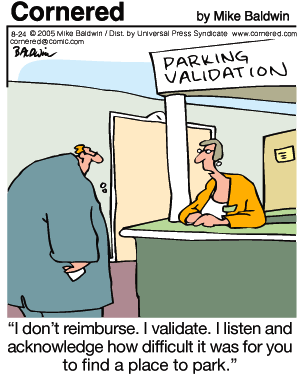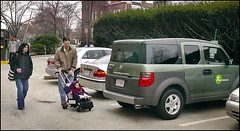High Cost of Free* Parking Revisited and Car Sharing in DC
 Entitlements aren't only for the "poor."
Entitlements aren't only for the "poor."____________
There is a story that Abraham Lincoln represented a railroad in its quest to build the first bridge over the Mississippi River. The bridge was opposed by the steamboat owners, who sued to stop the bridge. The lawyer for the river interests closing argument was long, detailed, and well-laid. Lincoln's close was just a few words, centering on the question -- "Who has more rights? The people who want to cross the river? Or the people who travel on the river? Lincoln won the case, because the usage privileges needed to be balanced.
____________
All car users are not car owners. Do car owners have more rights than car users? Do car owners have more "privileges" than car users? And do car owners believe that privileges are "rights"?
____________
"The High Cost of Free Parking" was a blog entry from March. It's worth rereading because of the hullabaloo about providing dedicated street spaces to car sharing services such as Flexcar and Zipcar. The Washington Times published a negative article (with some great photos, alas, the WT isn't nearly as liberal as the Post in terms of putting up photos on their website) on Monday, "D.C. saves spots for car-rental parking" and DCist wrote about it in their Tuesday Transportation Roundup.
One of the DCist commenters mentioned the Arlington County Commuter website, in particular the section on Car Sharing, and the report, online, that Arlington produced based on their pilot study of this program. According to the Arlington website, various studies find these carsharing benefits:
• reduces car ownership,
• encourages more transit trips,
• reduces the number of cars on the road,
• reduces the number of vehicle miles traveled (VMT),
• reduces pollution,
• saves gas, and
• provides for a more efficient use of parking spaces.
For details see Arlington pilot carshare program first-year report.
 Matt Clausen and Margarita Diaz use a Zipcar for errands. Owning a car "was more of a hassle than anything," he said. (Gerald Martineau -- The Washington Post)
Matt Clausen and Margarita Diaz use a Zipcar for errands. Owning a car "was more of a hassle than anything," he said. (Gerald Martineau -- The Washington Post)Anyway, in another blog entry on car sharing from March, "Dr. Transit: Car Sharing in DC" I wrote about the proposal for dedicated parking spaces and at that time, I wasn't fully positive, believing that DC should be paid some for the use of the public space. Now I feel somewhat differently, because of the positive public policy benefits. This is what I wrote on the DCist site:
(1) Why should car owners be the only people "entitled" to use parking spaces? Parking spaces are part of the public space-municipal property inventory that is "owned" by all citizens. My web entry about Donald Shoup's book, "The High Cost of Free Parking," mentions the fact that 16% of San Francisco's total public space is parking spaces on the streets.
(2) Other residents deserve access to street parking spaces, to serve their needs, and these needs are met in part by providing dedicated street spaces to car sharing programs.
Since the overall impact is a reduction in the number of cars owned by District residents (which means fewer cars competing for a limited number of parking places), providing such dedicated spaces is sound public policy.
Finally, comparing DC's DDOT website section on Car Sharing to Arlington's, we've got a ways to go in terms of marketing alternative transportation options in the city. Arlington's Commuter Page is a great "customer-oriented" website that likely is a best-practice model.
____
* Parking isn't exactly free for residents. Most have to pay for ward residential parking permit, but the cost is negligible.



0 Comments:
Post a Comment
<< Home